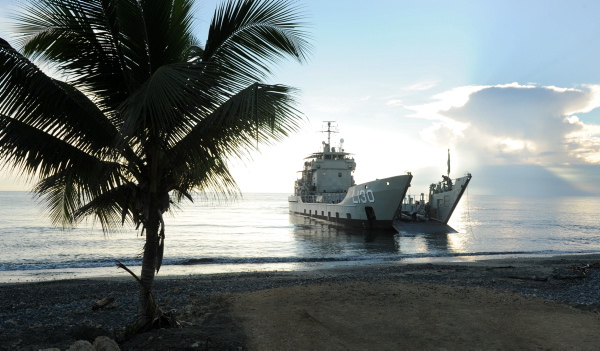 Today’s Defence White Paper confirms an increasing focus on the security, stability and cohesion of Papua New Guinea, Timor-Leste and the South Pacific states.
Today’s Defence White Paper confirms an increasing focus on the security, stability and cohesion of Papua New Guinea, Timor-Leste and the South Pacific states.
Minister Smith signalled Government’s intent to ‘bring our own immediate neighborhood back into sharp focus’ by appearing at yesterday’s inaugural South Pacific Defence Ministers meeting in Tonga.
A decade after the invasion of Iraq, the ten year-anniversary of the Regional Assistance Mission to Solomon Islands (RAMSI) in July will mark a less contentious but equally significant juncture in Australian strategic policy. Smith has indicated Government’s keen to avoid further ‘commitments to distant land-based operations’. Instead, we want to focus on closer enmeshment with South East Asian defence partners and helping to promote security in the South Pacific—especially the nearby, relatively large, populous and sometimes volatile states of Melanesia.
Yesterday’s meeting in Tonga gave some substance to these closer ties at a time when the ADF has actually just departed Timor-Leste and will shortly wind-up operations in Solomon Islands. Recognising the continuing potential for conflict in our shared backyard, the Joint Communique by the Australian, NZ, PNG and Tongan Defence Ministers commits to a range of useful initiatives to strengthen interoperability, information sharing, disaster relief, maritime security, and joint exercises.
‘Focusing close to home’ mainly reflects enduring interests in our immediate region, and assessments that recent stabilisation missions are unlikely to be our last. It’s also intended to deliver a post-Afghanistan peace dividend and avoid being all about China. Credible regional contingencies offer a useful basis for prioritising long-term force development (taking us ‘back to the future’ when pre-9/11 defence self-reliance meant being able to independently close the sea-air gap and stabilise regional hotspots rather than deter a far-off power). But the focus also responds to China’s growing regional presence, which complicates our strategic calculus even when Beijing isn’t deliberately poking us in the eye (for example when it sold Timor-Leste two patrol boats for mainly commercial reasons in 2008). A more active regional role could also help avoid a repeat of the ADF’s directionless period after Vietnam.
But while this attention to fostering security in our near neighbourhood seems warranted, it can be as difficult as it is important. And it’s been getting harder as our partners perceive new options for meeting familiar, deepening, challenges in a more competitive international setting. Although it’s far from clear our influence is declining, it’s equally uncertain whether our growing inclination to exercise leadership will be matched by neighbours’ readiness to offer what Graeme Dobell calls ‘followship’.
Strong economic growth has enabled Timor-Leste to take an assertive stance over our disputed maritime boundaries and to refuse to accept a regional asylum processing centre in 2010 for example. And Chinese diplomatic support, new avenues for borrowing funds, and access to untied aid have afforded Fiji’s military dictatorship at least temporary breathing space in its quarrel with the region.
Militarily, our different histories and circumstances (we spend 250 times as much on defence as PNG) mean we have some different security perspectives and imperatives to even our most trusted partners, whose priorities focus on internal security. And what Greg Sheridan criticises as the White Paper’s settling for being a ‘good local cop but that’s all’ can be much harder than it sounds. Even a permissive, multinational intervention could soak up a lot of battalions and demand significant lift, organisation, and sustainment to address a major breakdown in the challenging physical and human geography of any Melanesian country. Intractable cross-cutting challenges—such as population pressure, environmental degradation, poverty, and maladministration—complicate security issues too. And even where strong growth’s occurring, it’s off a low base, unevenly spread, vulnerable to commodity price and investment fluctuations (PNG won’t enjoy significant LNG revenue until 2018), and can exacerbate social tensions (as could reoccur in Bougainville).
We’ll need to do more than allocate some additional resources if we want our near neighbours to welcome our extra attention and go along with our desire to lead. Making the most of our renewed focus will depend on innovative approaches to marshalling all our national levers and influence as well as honing genuinely expeditionary joint amphibious capabilities and defence partnerships.
Reviving our commitment to Pacific policing; deepening the conversation between Pacific scholars and security policy planners; reinvigorating efforts to promote regional economic growth; updating national coordination mechanisms; developing new tools to maximise Australia’s underutilised soft power and revitalising our relationship with the Pacific Forum, will all be equally important to maximise the value of our renewed focus.
These issues will be with us for some time to come. I’ll expand on these themes in a forthcoming ASPI Insight publication, and Sam Bateman, Anthony Bergin and Hayley Channer will shortly publish an ASPI Strategy on the future of Australia’s Defence engagement in the region.
Karl Claxton is an analyst at ASPI. Image courtesy of Defence.

